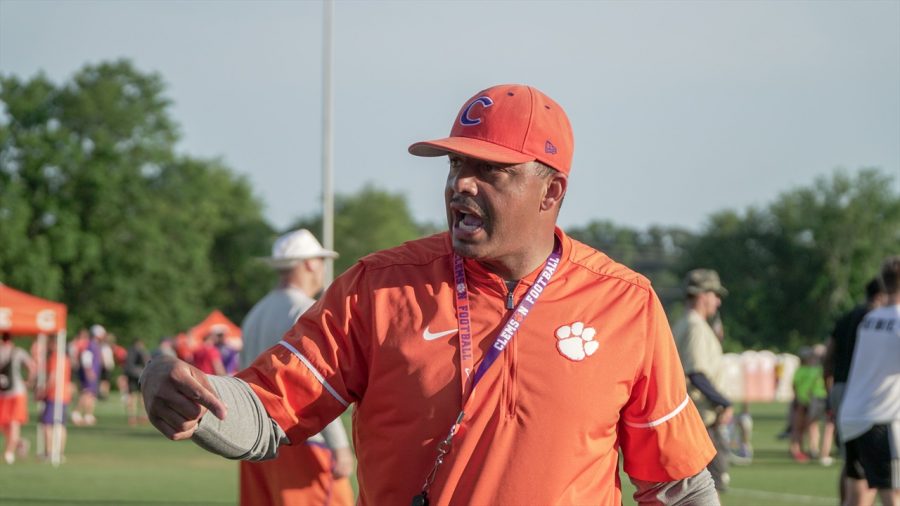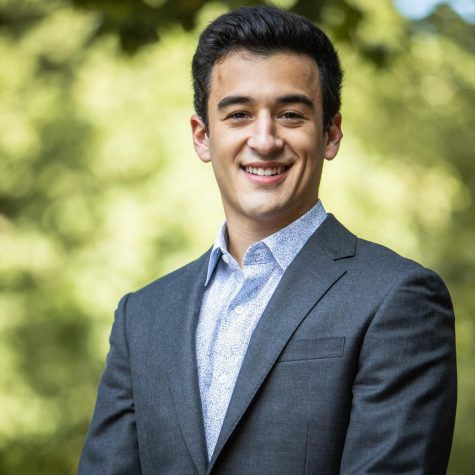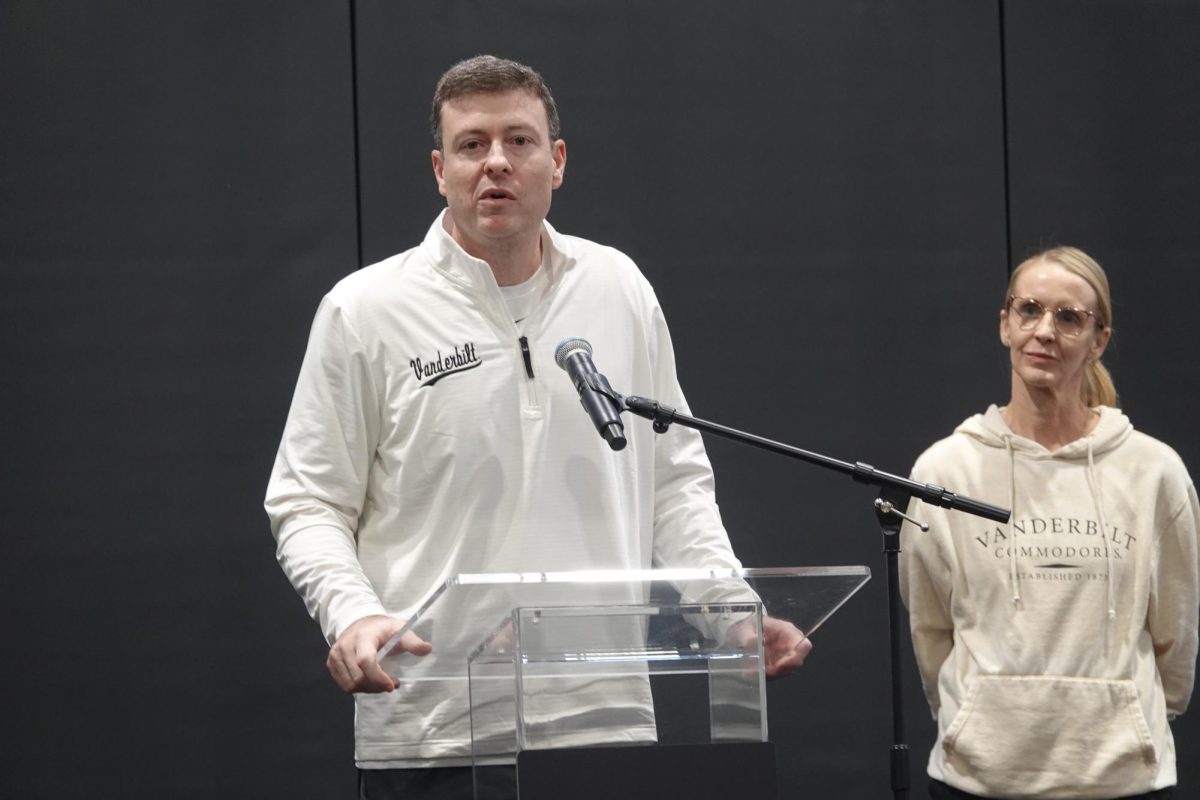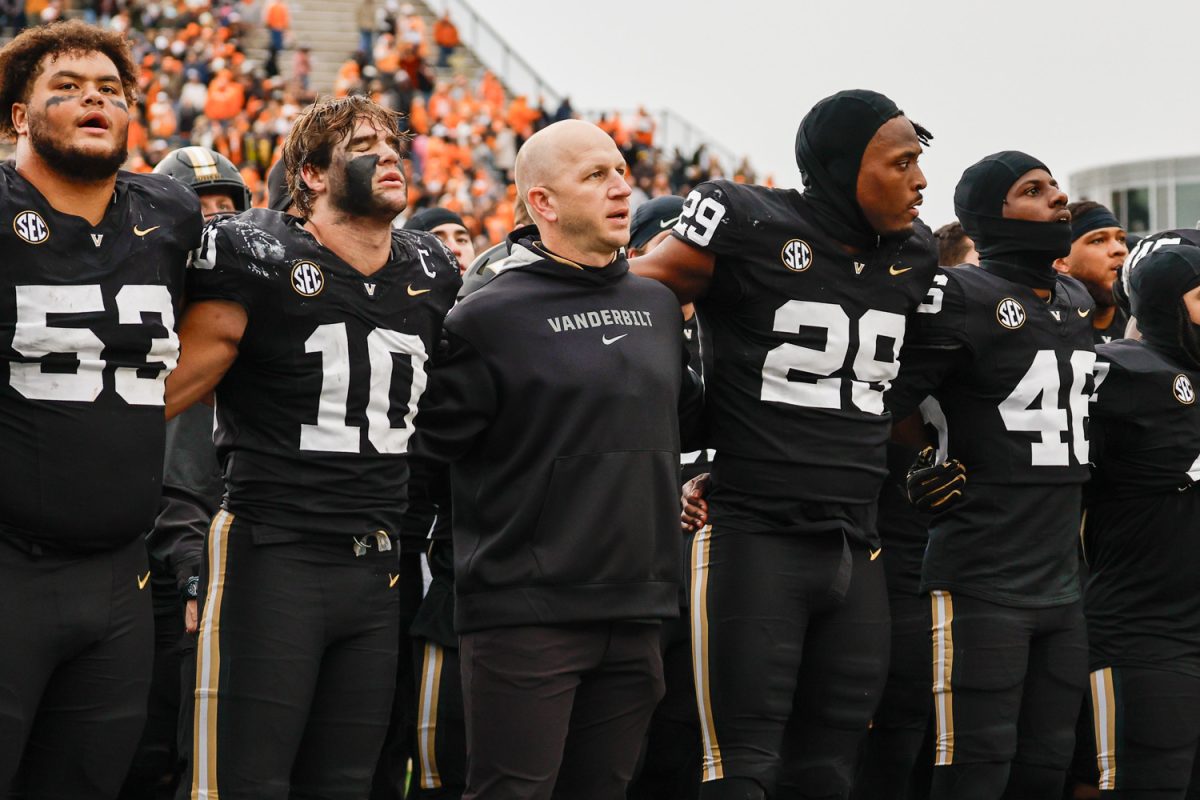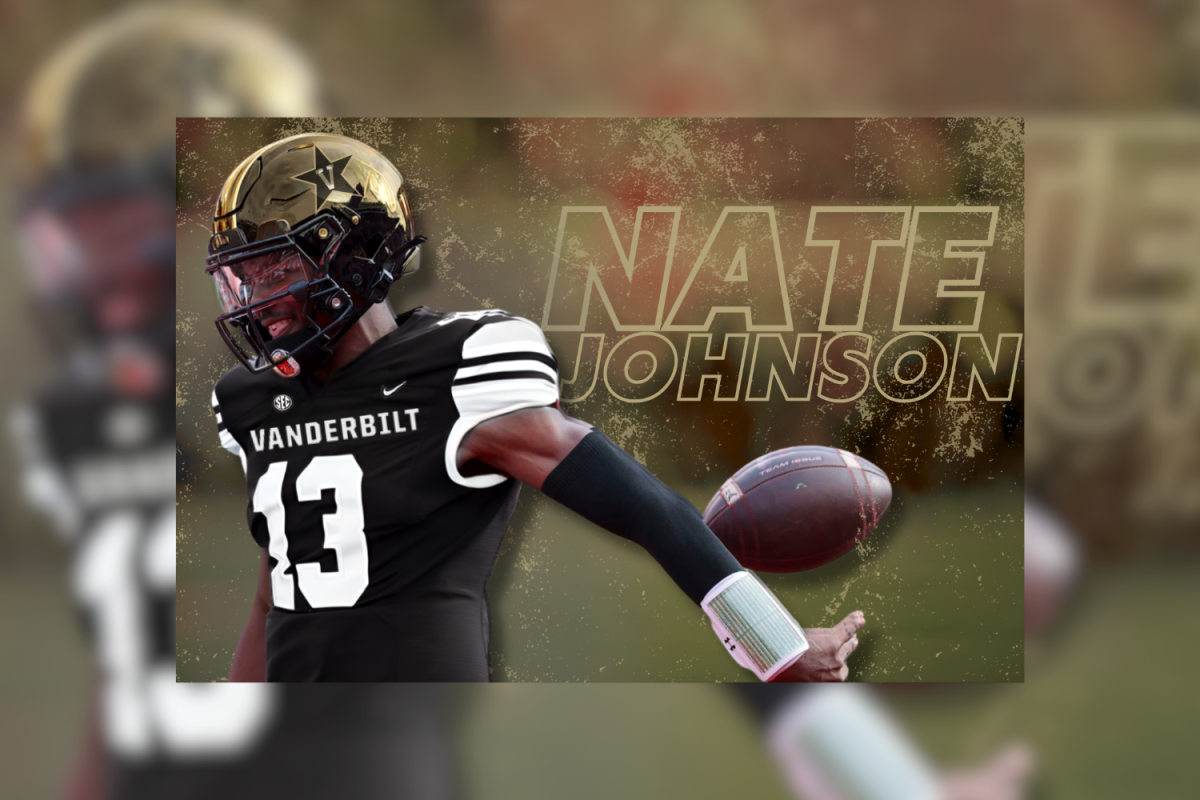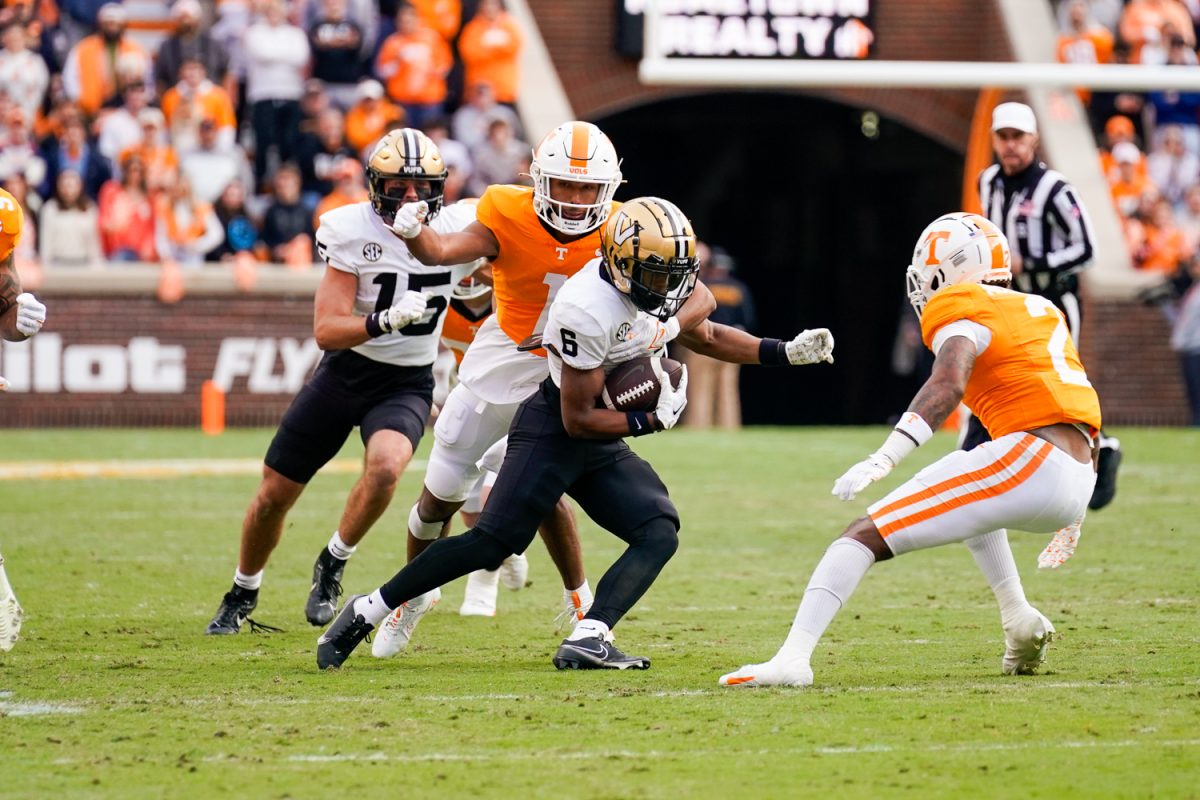Seven seasons, 27 wins and 55 losses later, Vanderbilt fired head football coach Derek Mason.
And kudos to Vanderbilt—because Vanderbilt made it clear that Vanderbilt wants to win. Vanderbilt made it clear that its 0-8 record in 2020 isn’t going to cut it, despite the pandemic, despite the difficult, conference-only schedule.
But the way I see it, Vanderbilt has merely a desire to win. And in the Southeastern Conference (SEC), a desire to win—much like the 0-8 record—isn’t going to cut it. In order for the smallest school and the only private institution with the highest academic barriers in the SEC to win, it must be more than a desire.
It must be a commitment.
If Vanderbilt commits itself to winning, if Vanderbilt truly does capitalize on what athletic director Candice Storey Lee deemed “an opportunity to put our money where our mouth is,” then Vanderbilt must swing for the fences in its coaching search. It must hire a coach that raises eyebrows. (And when I say raise eyebrows, I mean impress people. Raising eyebrows by reportedly interviewing a candidate that no one—not in college or in the NFL—has even the slightest interest in interviewing is not what I hope to convey.)
Here’s how you swing for the fences: go to one of the best programs in the country, one that’s brought home two national championships in the past five years. Interview Tony Elliott, the offensive coordinator of a Clemson Tigers team that has produced a lethal, record-breaking offense under his tutelage, and offer him the job.
Better yet: offer him the job and your commitment. Show him the plans you have in place; give him the budget that he and this program so clearly deserve.
Show Tony Elliott how deep your pockets are and maybe—just maybe—you’ll be able to court away a Clemson alum with a $1,500,000 salary from his alma mater. (Probably not. But here’s my argument as to why and how Vanderbilt should try.)
It starts with Vanderbilt football’s facilities— it’s no secret they are well-outdated. Its stadium is antiquated and raggedy. Its homebase is in the McGugin Center, where it’s forced to share space with every single varsity sport. Elliott won’t take Vanderbilt seriously if the university doesn’t outline some significant upgrades—and that’s half the reason why I want Lee to go after him.
Again, I don’t want Vanderbilt’s hire to reflect a desire to win. A desire to win won’t get you further than two bowl losses, a few ranked wins and a tumultuous record in seven years.
A desire to win will have your head coach telling the media that “in my time in seven years, we haven’t been able to do anything” about the mediocre facilities.
I want Vanderbilt’s hire to reflect a commitment to winning. By going after Elliott, by even having the urge to approach a national championship-winning head coach, Vanderbilt has to make a proper proposal.
That probably means a full-fledged stadium renovation—not talks of renovation, but an actual, concrete plan. I would assume it means moving the football team out of McGugin and into their own homebase. And it would certainly, without a doubt, mean finishing those damn locker room renovations that they’ve spoken about since February. (As an aside: those can’t come soon enough, after Dan Mullen and the Florida Gators embarrassed Vanderbilt to the point of refusing to use their locker rooms because they’re too small.)
So, the first reason Vanderbilt should chase after someone like Elliott?
It forces them to spend money. Leaves them no other choice. Why on earth should Elliott leave a program that has enough money to literally build a playground slide in their facilities because “Coach Swinney wanted the most fun Football Ops Facility in the country”?
Well, newsflash: Vanderbilt has that money, too.
In truth, hiring Elliott would do more than just force Vanderbilt to spend money that it hasn’t in years past. Hiring Elliott would fit the bill of what this program needs.
After Mason’s firing, Lee said she wants an “offensive-minded” coach, and Elliott is the quintessential offensive mind. Not in the Sun Belt or the Conference USA like some of these other candidates—this is one of the best offensive minds in the country. If you don’t agree, say that to his national championship rings.
Elliott, who received the 2017 Frank Broyles Award as the nation’s top assistant coach, was a wide receiver for the Tigers from 2000-2003, and later returned to the program in 2011 as a running backs coach. From there, he was promoted in 2015 to co-offensive coordinator and running backs coach, and this season he became the lone offensive coordinator. Since his arrival in 2011, the Tigers have amassed nine straight 10-win seasons, six ACC titles and two national championships.
Is Elliott the sole reason for Clemson’s success? Of course not. But take a look at what he’s done: as a running backs coach, he coached Andre Ellington, a first-team All-ACC selection, who became the first running back in program history with two 1,000-yard rushing seasons; he coached Roderick McDowell, an All-ACC selection, who also eclipsed 1,000 yards; he coached Wayne Gallman, another All-ACC selection, who also had two 1,000-yard seasons. Then, of course, there’s Travis Etienne, the Tigers’ current running back, who entered his senior season with more than 4,000 rushing yards and appears on pace for another four-digit performance in 2020.
They can run the ball, and they can run it well. While the Tigers’ rushing attack has taken a step back in 2020, I attribute the decline to the revamped offensive line and star quarterback Trevor Lawrence missing games due to COVID-19. I don’t think that outweighs the team’s 240 rushing yards per game in 2019 (13th in the country). Or the 249 rushing yards per game in 2018 (10th in the country). You get the point.
Their passing offense is no different, and the Tigers have thrived in recent years—thanks to both Lawrence’s excellent performance and Elliott’s enabling playcalling. Routinely in the nation’s top-25, the Tigers threw for 288 yards per game in 2019 and 279 yards per game in 2019. With 346 yards per game in 2020, Clemson currently ranks seventh in the nation—despite Lawrence’s brief absence.
Lawrence has played well in the eight games he’s started this season, but when he went down with COVID-19, backup quarterback and true freshman D.J. Uiagaleiei stepped into Elliott’s system with ease. Against Boston College, he completed 30 of 41 passing attempts for 342 yards and two touchdowns. Against Notre Dame, he completed 29 of 44 attempts for 439 yards and two touchdowns (sorry, Clark Lea). And he didn’t throw a single interception.
Since Elliott was promoted to a co-coordinator role in 2015, Clemson’s offense has averaged 501 total yards of offense per game.
That’s some offensive mind.
You may wonder whether Elliott, a 41-year-old coach who has only served in coordinator and assistant roles in his time at Clemson, Furman and South Carolina State, has what it takes to be a head football coach. Vanderbilt has hired first-time head coaches before (see: Derek Mason, James Franklin, Bobby Johnson—the university does this quite often), but perhaps none with the recruiting repertoire of Elliott. In 2015, he was named ACC recruiter-of-the-year by Scout.com; a very well-deserved honor, seeing as his historic class carried with it an elite offensive line and now-NFL star Deshaun Watson.
At Vanderbilt, he may not have the same sales pitch he has at Clemson, but he’ll always have the national championship rings. He’ll always be able to tell recruits that he knows what it takes to coach a national champion. I’m not trying to say that Vanderbilt will ever get there; I’m simply stating that he can enter a high schooler’s home and assure his parents that he has provided, can provide and will provide a path to success both in college and beyond. In the SEC, that’s a must. Again: it can’t be easy to try selling a recruit on your Sun Belt or the Conference USA ring, when Alabama’s Nick Saban, Ole Miss’ Lane Kiffin, Texas A&M’s Jimbo Fisher, Georgia’s Kirby Smart, LSU’s Ed Orgeron and even Tennessee’s Jeremy Pruitt can say they’ve coached national champions.
All that’s to say: it’s past time Vanderbilt makes a homerun hire. Not just because the candidate can boast what other SEC coaches can, but also because it forces them to spend big.
It’s time for the Commodores to travel to Clemson, bringing with them only a job offer, a Brink’s truck and a construction company on speed dial. (This is an entirely unrealistic possibility. Perhaps I should’ve stated that earlier. But my point of committing to winning remains.)

